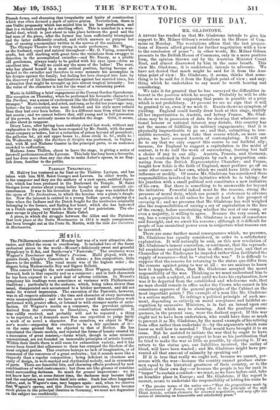311 noir.
The Philharmonic concert of Monday last was of a very attractive cha- racter, and filled the room to overflowing. It included two of the finest orchestral pieces in the world—Mozart's deliciously sweet and graceful Symphony in E fiat, and Beethoven's "Pastorale." The overtures were Wagner's Tatmhatiser and Weber's Preeiosa. Halle played, with ex- quisite finish, Chopin's Concerto in E minor; a fine composition, little known to the public. The vocal music was of the highest order ; the singers being Mademoiselle Nay and Signor Belletti.
This concert brought the new conductor, Herr Wagner, prominently forward, both in that capacity and as a composer ; and in both characters he has been exposed to a good deal of adverse criticism. In Mozart's symphony his readings were sometimes at variance with Philharmonic traditions ; particularly in the andante, which, being taken slower than usual, disappointed ears accustomed to a brisker movement, and did not make its wonted impression. The execution of the Pastorale, however, was in all respects admirable ; the time and character of every movement were unexceptionable ; and we have never heard this marvellous work performed with greater effect, or listened to with stronger marks of satis- faction. Of Wagner's merits as a composer, the prevalent opinion, derived from the overture to Tannhariser, was unfavourable. It was coldly received, and probably will not be repeated ; a thing to be regretted, as it demands more than one repetition to judge fairly a work of so novel a character. For ourselves, we object to Wag- ner's music—supposing this overture to be a fair specimen of it on the same ground that we objected to that of Berlioz. He has repudiated the classic models, and rejected the forms of beauty created by a succession of great masters,—forms which, though in some measure conventional, are yet founded on immutable principles of artistic beauty. Within their limits there is still room for exhaustless variety, and it has never been found that adherence to them has cramped the freedom of the most original genius. This overture betrays no lack of imagination, or of command of the resources of a great orchestra ; but it sounds more like a rhapsody than a regular composition ; being deficient in clearness and unity of design, in well-marked and rhythmical melody, and in symmetry of parts. There are beautiful bits, and charming effects produced by new combinations of wind-instruments ; but these are like gleams of sunshine amid surrounding darkness. So much for present impressions : we do not know how far, at some future time, the darkness may become light and the confusion may resolve itself into order. Such has often happened before, and, in Wagner's case, may happen again : and, when we observe that Wagner's operas, and this Tannhauser in particular, have become stock pieces in the principal theatres in Germany, we must not dogmatize on the subject too confidently.


























 Previous page
Previous page